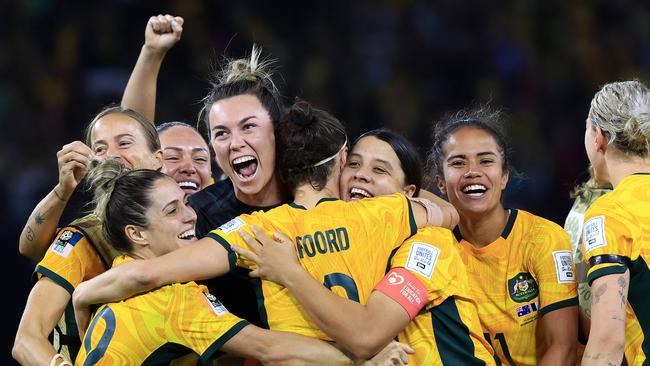A $100m demand looms for World Cup TV rights as Matildas drive broadcast interest
FIFA want big bids for the next World Cup broadcast deal, but match times will dictate how much Australian TV networks will pay even as Matildas drive interest.

FIFA wants a $100m payday from the next soccer World Cup broadcast rights, and bids are expected from all of Australia’s major free-to-air networks as well as SBS and Optus.
The world governing body is trying to double the amount it makes from the Australian market, thanks to interest being at fever pitch during the Women's World Cup.
In a twist, Football Australia could try to cash in on the sport’s popularity and also bid for World Cup rights, which it would then bundle with Socceroos and Matildas games to sell into the local market.
FIFA is meeting with Australian television networks this week to discuss the rights, following the launch late on Monday of two separate invitations to tender for media rights to the men's World Cup in 2026, hosted across North America, and the yet to be determined Women's World Cup in 2027.
The tenders include the potential to bid for the following tournaments in 2030 and 2031 for the men and women respectively and FIFA is likely to seek double the amount it had previously received from Australian broadcasters.
SBS had in 2011 clinched a deal with FIFA to extend what was then its longstanding broadcast contract for the 2018 and 2022 men's World Cups, having shown each tournament in its entirety since 1990.
The deals were for about $20m for Russia in 2018 and another $20m for Qatar in 2022, up from about $30m combined for the 2014, 2010, 2006 and 2002 tournaments.
Optus is paying up to $30m for the current Women's World Cup, and has on-sold the free-to-air rights to Seven West Media for about $4m.
Free-to-network sources indicated that Seven, Nine Entertainment Co, Network 10 and SBS would all at least officially express interest in the rights, which FIFA wants to receive bids for by September 19.
Federal government sources said it was unlikely the entire Women's World Cup would be placed on the anti-siphoning list for the foreseeable future, leaving the way open for streaming services like Optus to bid.
The world governing body will push for a doubling of the rights fees, which would be about $100m for both men’s and women’s tournaments, but local television sources said the timing of the matches for Australian audiences would determine how keen the bidders were.
Matches in the US, Mexico and Canada in 2026 will mostly kick-off in morning and lunchtime slots across Australia. The winning host for 2027 will be announced next year.
Brazil, South Africa, the US and a joint Netherlands, Belgium and Germany bid are chasing the hosting rights.
In a twist, Football Australia may attempt to win the World Cup rights and package them with Matildas and Socceroos games – and potentially the 2026 Asian Cup that Australia could host – that it is seeking bids for later this year ahead of the expiry at the end of next year of its current $100m deal signed in mid-2021
FA chief executive James Johnson would not be drawn on his organisation’s complete broadcast strategy but said “we’re expecting a record-breaking broadcast deal because of the strong (broadcast) metrics around not only the Matildas but also the Socceroos”.
“We saw that during the Qatar World Cup last year and other friendly matches,” he said.
Broadcast rights expert Colin Smith predicted that the price for the Women's World Cup rights to boom and that the issues FIFA faced selling the rights to key European markets for the 2023 event – including lukewarm interest from TV networks – would not happen in the future.
“The price will go very significantly northwards,” Mr Smith said. “As I understand the viewership numbers in Europe and North America are strong as well.”
For Australian broadcasters the time difference, wherever the 2027 tournament will be played, will impact the fee, however events like the Tour de France have proven Australian fans will still switch on in the midnight hours.
“The Tour de France annually – that’s midnight to dawn – and now with this World Cup recognising the standards, the competitive tension is high; the fact the Matildas had not previous played in the semi-finals,” Mr Smith said.
“It is more open than the men’s game, which is great.”


